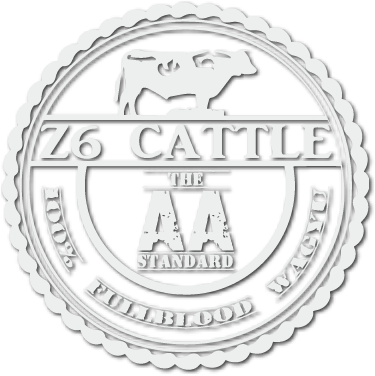Wagyu is a unique breed that has amongst its key attributes, other than the exquisite marbled beef quality, a high calving ease, excellent (docile) temperament, resilient in the feedlot and has a high (dressing percentage) carcass yield. Most important is the economic value derived from each animal, which is currently 100% more than pastoral cattle, sold at either the farm gate or as a long fed carcass.
Crossbreeding Wagyu with other breeds is alternative to Fullblood Wagyu breeding. The aim of crossbreeding is to introduce the Wagyu characteristics to enhance the carcass traits and other desirable traits of the Wagyu breed. Although introducing Wagyu into a herd is traditionally done to increase marbling and eating quality of the carcass, several producers have introduced Wagyu to increase fertility in their herd also.
Because they are genetically distinct from British, Continental, and American breeds, heterosis can be maximized by using Wagyu in a crossbreeding program. One such benefit is seen through the low birth weights associated with Wagyu but animals reach the large mature size of the crossed breed.
Marbling and Health Benefits
Beef is a significant source of healthy fats, including monounsaturated fat (MUFA) and conjugated linoleic acid. Wagyu beef is even better! It contains a much higher ratio of MUFA to saturated fat and it has been shown in human studies to improve cholesterol levels. MUFA’s primary component, oleic acid, is also associated with the rich flavor, soft and low melting point of the fat, and tenderness of the cooked beef. Compared to ordinary beef, Wagyu beef has 30% more CLA, which studies have shown reverses diabetes symptoms, reduces body fat and deters the buildup of arterial plaque.
Calving Ease
The high Tajima line of Wagyu bulls is desirable for first crosses due to their high marbling characteristics passed on to the progeny. Many producers breed F1 or F2 progeny as terminal offspring using the Tajima genetics. Black Wagyu bulls offer many advantages to the commercial cattleman or the local beef producer, this includes calving ease. Low birth weights–about 45-55 pounds–make Wagyu perfect for first calf heifers. When used on Angus cows, average birth weights are 55-65 lbs.
Fertility
Wagyu bulls and cows reach puberty early, are very fertile, and have a strong libido. The bulls can service many more cows than most other breeds. Secondly, the black wagyu are very heat tolerant and remain very fertile when most other animals struggle with heat stress. Furthermore, it is common for bulls and cows to remain in service until 18 years old. One other very important trait is that Wagyu cows have outstanding udders with amazingly very little issues. Udders of Wagyu cattle over 10 years old look as if they did when the cow had her first calf. The outstanding udder of the Wagyu is also passed down to the offspring of the F1 cross.
Temperament
Wagyu bulls have an easy going temperament and are among the most gentle of breeds. This pays off in the feedlot with better performance, improved carcass merit, and reduced treatment costs.
Carcass Yield and Premiums
With their unique genetic ability to accumulate marbling, Wagyu cattle produce the highest percentage of prime carcasses. Wagyu have less back fat and larger rib eye area for any given carcass weight, which results in a better yield grade. Due to their quality and refinement of bone, Wagyu have a much better meat to bone ratio than most other breeds and will pass this on to their calves. F1 Wagyu feeder calves can be sold at a premium due to the high demand for prime beef; wagyu carcasses deliver quality and yield grade premiums; and 100% fullblood wagyu which are grass fed maintain a high level of marbling and is more profitable for the local beef producer.




